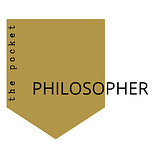Good morning friends,
Today we’re going to continue our conversation around peace, looking at Just War Theory. I’ll share some historical context in the Backstory section below, but suffice to say this theory is the basis for modern, global legal norms regarding war the rights of nations. While yesterday we considered a world where peace is accepted as our collective homeostasis, today we look at the world assuming that war is our natural state.
Thought
War is a world apart, where life itself is at stake, where human nature is reduced to its elemental forms, where self-interest and necessity prevail. Here men and women do what they must to save themselves and their communities, and morality and law have no place.
—Michael Walzer, Just and Unjust Wars
Application
To be frank, Just War Theory is relatively complex. It’s not hard to understand as much as there are many simultaneously evolving components. This makes using it as a decision matrix fairly difficult.
We’ll hit the tops of a few important waves in this section and go a bit deeper in the backstory below, but if this interests you it’s definitely worth investigating further as there is a lot more out there to learn.
Just War Theory approaches the world through the lens of nations, and through the rights that those nations—as separate, competing entities from one another—and the rights they hold. The leaders of these nations and their defense forces are considered the rational actors, while the civilian population is considered potential collateral damage to be protected at all costs. (A certain amount of civilian death is expected and accepted.)
There are 3 distinct camps when it comes to theories of war. On the far side there is the school known as realists, who hold a very legalistic/fundamentalist perspective about war and seek to regulate it while accepting (potentially advocating) its existence.
On the far opposite side are pacifists who believe that war is never a viable response. Just War theory holds the space in between these two perspectives, seeking to limit war-making, but also regulate it when it does occur.
Micheal Walzer, as quoted above, is the modern day keeper of this tradition which stretches back to the renaissance of the European middle ages (this tradition is deeply connected to western and Christian philosophy).
In order to prevent war and regulate it, Just War theory uses 2 main categories of ethical constructs: Ad Bellum and In Bello. The former governs the decision making of nations deciding to go to war, and latter the soldiers who fight in war.
Nations and their leaders are responsible for Ad Bellum decisions, and soldiers (as well as nations) are responsible for In Bello actions. If a soldier acts justly in a war that is itself not justified—so the theory goes—the soldier is not to be held accountable for any wrongdoing.
Not be too visceral, but I distinctly remember being taught in the Army that my job as a junior officer was to lead a band of “teenage murders” across the world to achieve America’s objectives, and decide when to “let loose” and “pull back” the soldiers so as to maintain adherence to the Uniformed Code of Military Justice, Geneva Conventions, and other wartime regulations.
I share this because this was an example of this ethical framework making its way to the lowest levels—that as long as we did not go too far in war, soldiers were there to kill and bring chaos and that was totally justified.
Where things get start to get difficult is the use of preemptive war as a tool of philosophical necessity. This can serve as a bit of a loophole in the international community for a nation wishing to engage in war in that they simply must prove an existential threat to their safety is imminent. Pre-emptive war is allowed as a measure of last resort, and proving “last resort” is a task fraught with confusion for both those providing justification and those making the judgement.
It makes wars based on felt threat and failed diplomacy possible, which for many reasons is a bit of a dangerous game.
Backstory
This theory originated in a different time to be sure. In a time before the world was globally connected. In fact, this theory was developed primarily by and for European city-states coming out of the Dark Ages. It’s largely how the Popes morally justified wars they initiated or supported.
As it evolved, it sought to capture when and how war was permissible in an ever-evolving world while remaining rooted in its western/christian background. In time, its modern heir has come to legally govern international law as it relates to the sovereignty of nations.
This modern expression seeks to walk a middle path between extremes which, in this particular topic, is a very difficult path no matter how you spin it. In many ways, this theory often becomes a checklist that a nation desirous of war can bend in their direction and check off to get international approval.
But one of the most interesting facets of the theory relates proportionality. These concepts strictly govern the behavior associated with war.
For war to be justified, the following must be true:
Just Cause: the war is an attempt to avert the right kind of injury.
Legitimate Authority: the war is fought by an entity that has the authority to fight such wars.
Right Intention: that entity intends to achieve the just cause, rather than using it as an excuse to achieve some wrongful end.
Reasonable Prospects of Success: the war is sufficiently likely to achieve its aims.
Proportionality: the morally weighted goods achieved by the war outweigh the morally weighted bads that it will cause.
Last Resort (Necessity): there is no other less harmful way to achieve the just cause.
And in war:
Discrimination: belligerents must always distinguish between military objectives and civilians, and intentionally attack only military objectives.
Proportionality: foreseen but unintended harms must be proportionate to the military advantage achieved.
Necessity: the least harmful means feasible must be used.
If you take a minute to ponder #5. above, there is a lot of room for interpretation, for one nation to stake their moral bent as superior to another, to justify their actions and sell their just cause so long as they hold more of a voice in the international community than their opponent.
Similarly, proportionality in wars makes room for civilian death, which is also a tough concept to swallow—pre-emptively knowing that innocent death will occur in the achievement of one nation’s moral “good” seeking outweigh a perceived “bad.”
And yet, as Walzer noted above, once a war begins we are far beyond ethics and much more focused on survival—acting from the reptile, dualistic portions of our brains.
And so I’ll leave you with a thought that is very personal but also very intentionally thought out over a long period of time.
Is Just War Theory a midwife of sorts, guiding us from one way of being —disconnected, separate, fearful of the other—to a new way—empathetic, unified, compassionate, patient, and peaceful?
And if so, what does that world look like? What would a theory of war look like that doesn’t assume we are separate and pitted against one another from the start? What would a theory look like that does not accept any civilian collateral damage? What would a theory look like that does not seek to regulate war, because it instead if governs our peace? What if we accepted that war is almost never a “last resort” but instead a tool for the powerful to increase their power?
And so with that, we’ll wrap up for the day.
Be well friends.
And be sure to stop by for a special gust post by my good friend Josh Scott who has a lot to say on the subject of peace.
Until then,
Matt
References:
https://plato.stanford.edu/entries/war/#Nece
https://oregonstate.edu/instruct/phl201/modules/just_war_theory/criteria_intro.html#:~:text=The%20history%20of%20Just%20War,as%20it%20is%20used%20today.
http://www.notable-quotes.com/w/walzer_michael.html#:~:text=War%20is%20a%20world%20apart,and%20law%20have%20no%20place.















Share this post